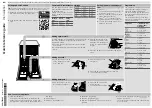
30
J9
Long idle periods
Whenever the appliance is not going to be used for a
long period of time (e.g. one month), carefully carry out
the following instructions.
•
Close the water supply cock.
•
Completely drain the tank and carry out a cleaning
cycle (see instructions in the paragraph J8.1 “End
of service and daily internal cleaning”)
•
Remove and carefully clean the filters.
•
Completely drain the incorporated dispenser
hoses, removing them from the containers. Repeat
the procedure described in the paragraph “Manual
activation” at least 3 times.
•
Completely drain the boiler by simultaneously
pressing the buttons as shown in the figure
•
A buzzer indicates completion of drainage.
•
Clean the inside and outside of the appliance as
indicated in par. J8.1 “End of service and daily
internal cleaning” and J8.2 “Exterior cleaning”.
•
Spread a film of paraffin oil over the steel surfaces.
When using the appliance again, follow the indications
in par. J4 “Daily activation of appliance”.
J10
Maintenance
Inspection and maintenance intervals depend on the
actual appliance operating conditions (total wash
hours) and ambient conditions (presence of dust,
damp, etc.), therefore precise time intervals cannot be
given. In any case, to minimize interruptions of the ser-
vice, careful and periodical appliance maintenance is
advisable.
Therefore, it is advisable to:
•
Descale the boiler, inside surfaces of the tank and
the appliance piping once or twice a year (call tech-
nical assistance).
•
Every month descale the wash and rinse jets with
vinegar or scale remover.
•
The internal hose of the rinse-aid and detergent
peristaltic dispenser should undergo periodic main-
tenance (once or twice a year).
•
Clean the water filter installed on the supply inlet
pipe, and the solenoid valve protection filter at least
twice a year (call technical assistance).
It is also advisable to stipulate a scheduled pre-
ventive maintenance contract with technical assis-
tance.
J10.1 Preventive maintenance
The preventive maintenance call can be activated (call
technical assistance).
On reaching the set number of cycles (e.g. 20000), a
technical assistance call message appears on the dis-
play.
This message suggests calling a specialized techni-
cian, for a general check of the equipment.
J11
Appliance disposal
At the end of the product’s life cycle, make sure the
equipment is not dispersed in the environment. The
equipment must be disposed of in compliance with
current regulations in the country of use.
All metal parts are in s/steel (AISI 304) and removable.
Plastic parts are marked with the letters of the material.
The symbol
on the product indicates that this
product should
not
be treated as domestic waste, but
must be correctly disposed of in order to prevent possi-
ble negative consequences for the environment and
the human health.
Regarding the recycling of this product, please contact
the sales agent or dealer of your product, your after-
sales service or the appropriate waste disposal service.
J12
Troubleshooting
-
+
THE APPLIANCE DOES NOT WASH WELL
1. Check if the suction filter is dirty and clean it thoroughly.
2. Check if the wash jets are clogged and clean them.
3. Check that the initial amount of detergent or subse-
quent additions are correct.
4. The selected wash cycle is too short. Repeat the cycle.
5. Check that the tank temperature is at least 55°C /
131°F.
6. Check that the items are stacked correctly in the racks.
EXCESSIVE FOAM IN THE TANK
1. Check that the wash water temperature is not less than
55°C / 131°F.
2. Check if the amount of product dispensed by the deter-
gent dispenser is excessive (see “setting the dispen-
sers” paragraph).
3. Ensure that the tank has not been cleaned with unsui-
table cleaners. Drain the tank and rinse thoroughly
before new wash cycles.
4. If a foaming detergent has been used, drain and refill
the tank with water until the foam disappears.
THE WASH OR RINSE ARMS TURN SLOWLY
1. Remove and thoroughly clean the arms.
2. Clean the wash pump suction filter.

































